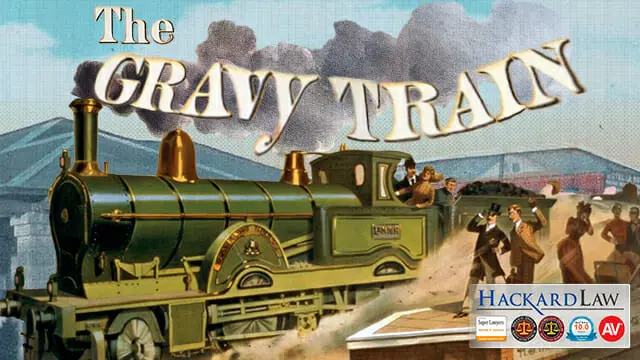
Gravy Train Trustees | California Trust Litigation
If you look through a few of our videos, you’ll see that I feel strongly about a number of issues.
One of these issues is trustee over-compensation. In particular, over-compensation of abusive trustees who have the duty to manage the assets of a trust fund.
The three key parties to the creation and management of a trust fund are the “grantor(sets up a trust and populates it with their assets), beneficiary (person chosen to receive the trust fund assets), and trustee (charged with managing the assets in the trust).” The overriding purpose of a trust agreement is to define how assets will be managed and held for the benefit of another person. This is an important concept.
The trust is set up to benefit another person, a beneficiary, not a trustee. Some trustees either ignore or forget this, the most basic of concepts. I’ll call these trustees the “Gravy Train Trustees.”
So, what do I mean by gravy train? The Urban Dictionary defines gravy train as “a job where no work is involved. To get paid for doing nothing. Standing around at work and talking all day.” Dictionary.com puts it another way. Gravy train is “a position in which a person or group receives excessive and unjustified money or advantages with little or no effort.” The Cambridge Dictionary defines gravy train as “a way of making money quickly, easily, and often dishonestly.”
This is not an invective against all trustees – no more than a criticism of the actions of some lawyers is an indictment of the entire profession. Just what is the duty of a trustee? Look at California Probate Code Section 16002, titled “Duty of Loyalty.”
The statute’s first sentence recites that “The trustee has a duty to administer the trust solely in the interest of the beneficiaries.” This makes sense, doesn’t it? Would a grantor of a trust populate the trust with her assets to benefit the trustee and not the beneficiary (the person chosen to receive the trust assets)?
California trustees have a “duty not to use or deal with trust property for the trustee’s own profit …” Trustees are named to administer trusts. Of course, sometimes trustees are also beneficiaries. Where there are two or more beneficiaries, even if one of them is also a trustee, “the trustee has a duty to deal impartially with them …”
Trust law concepts, on the one hand, can be simple, and on another, complex when applied to a specific set of facts. There are be varied interpretations of the law and their application to often disputed facts. But, after having practiced law for more than 40 years it seems clear to me that trusts are set up by their makers (grantors) to benefit beneficiaries (often their heirs).
Some trusts have introductory language that declares the trust maker’s intent. Language like:
- “The grantor desires to make gifts to his son, grandson and granddaughters, in the form of a trust. It is the grantor’s intent that the gifts remain in trust as their sole and separate property, and that their interest in the trust not be transferable of subject to assignment. The grantor intends for the trust estate to be used to enrich the life of his son, grandson and granddaughters, and not for the benefit of their spouses or creditors.”
This seems clear. How about:
- “The trustee shall pay to my granddaughter all of the net income of her trust, semi-annually or more in the trustee’s discretion. And the trustee has discretion to pay so much or all of the principal of her trust for her proper support, maintenance and health.
Now note that neither intent puts the needs of the trustee as the primary purpose of the trust. But cases like these get regularly litigated because the trustee ends up paying more to itself in fees than is distributed to the beneficiary. Was it really the grantor’s intent to benefit ABC Trust Company and shortchange his beneficiary?
So, we have a question – is there a better way? In particular, is there a better way to deal with a trustee who is not properly dealing with the grantor’s intention. One technique that we’ve utilized is the designation of a trust protector.
“A trust protector is a person or group of people (not the settlor, beneficiary, or trustee) who are appointed to exercise one or more powers affecting a trust and the interest of the beneficiaries. The concept of a trust protector is to protect beneficiaries from a rogue trustee. They can often make changes to a trust involving who the trustees are, investment decisions, change how distributions are made, and in some cases modify or terminate a trust.”
Most trusts don’t have trust protectors. Each case will have its own set of facts that need to be looked at and analyzed. While we handle a number of these types of cases, the remedies from one case to another may differ.
Some trustees will go willingly. Others will use up substantial trust assets to protect their position. Some cases get early judicial resolution while others drag on. In some cases, the trust can be easily changed, in others the challenge is daunting.
In any event, if you have a case that you would like to talk to us about, call us at 916 313-3010. Hackard Law represents Californians, out-of-state and out-of-country clients in California based estate, trust, probate and elder financial abuse litigation.
We litigate in most of California’s major urban Probate and Civil Superior Courts including Orange, Los Angeles, Santa Clara, San Mateo, Alameda, Contra Costa and Sacramento Counties.
We focus on substantial cases where we think that we can make a significant difference and there is a wrongdoer who can be made financially accountable for their wrongdoing.

 (916) 775-8542
(916) 775-8542